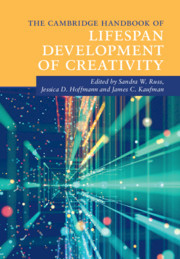The Cambridge Handbook of Lifespan Development of Creativity Cambridge Handbooks in Psychology Series
Langue : Anglais
Coordonnateurs : Russ Sandra W., Hoffmann Jessica D., Kaufman James C.

This handbook focuses on the development and nurturance of creativity across the lifespan, from early childhood to adolescence, adulthood, and later life. It answers the question: how can we help individuals turn their creative potential into achievement? Each chapter examines various contexts in which creativity exists, including school, workplace, community spaces, and family life. It covers various modalities for fostering creativity such as play, storytelling, explicit training procedures, shifting of attitudes about creative capacity, and many others. The authors review research findings across disciplines, encompassing the work of psychologists, educators, neuroscientists, and creators themselves, to describe the best practices for fostering creativity at each stage of development.
Introduction Sandra W. Russ, Jessica D. Hoffmann, and James C. Kaufman; Part I. Core Concepts of Lifespan Creativity Development: 1. Basic Concepts of Creativity Hansika Kapoor and James C. Kaufman; 2. The Creative Brain: A Developmental Snapshot Oshin Vartanian; 3. Pretend Play: A Microcosm of Creativity Sandra W. Russ; 4. Lifespan Development of Creativity Marc Bornstein; Part II. The Development of Creativity: 5. Are Preschoolers Creative? A Review of the Literature Natalie S. Evans, Molly A. Schlesinger, Emily J. Hopkins, Garrett J. Jaeger, Robert Michnick Golinkoff, and Kathy Hirsh-Pasek; 6. Development of Creativity in School-age Children Alexis W. Lee and Sandra W. Russ; 7. The Development and Enhancement of Adolescent Creativity Jessica D. Hoffmann and Elinor Hills; 8. The Intertwined Development of Identity and Creativity: Immersing in the Digital Self Baptiste Barbot; 9. Creative Development in Children from a Measurement Perspective Dimitrios Zbainos and Todd Lubart; 10. Creativity in Adulthood Maciej Karwowski and Ewa Wiśniewska; 11. The Many Faces of Creativity in Old Age Eva Kahana, Boaz Kahana, and Polina Ermoshkina; Part III. Modes of Enhancement: 12. Domain Specific Talent Development John Baer; 13. Enhancement of Creativity across Lifespan in Mainland China: Theoretical Inquiries and Practical Examples in the New Millennium Weiping Hu, Xinru Zhang, and Min Tang; 14. Beyond Flights of Fancy? The Relations Between Children's Imaginary Companions, Creativity, and Coping Naomi Aguiar and Marjorie Taylor; 15. Creating Imaginary Worlds Across the Lifespan Michele Root-Bernstein; 16. Imaginative Creativity in the Writing and Reading of Stories Keith Oatley; 17. The Effects of Video Games on Creativity: A Systematic Review Seyedahmad Rahimi and Valerie Shute; Part IV. Environments and Contexts: 18. Creative Identity Development in Classrooms Ronald Beghetto; 19. The Creativity in Children's Museums Garrett Jaeger and Helen Hadani; 20. Makers and Makerspaces: Developing Inventive Talent Barbara A. Kerr and Isaac Gardner; 21. Organizations and Creativity Roni Reiter-Palmon and Chelsa Dredge; 22. Creativity Development and Culture Izabela Lebuda, Vlad Petre Glăveanu, and Dorota M. Jankowska; Part V. Special Populations: 23. The Development of Gifted and Talented Students' Creativity in School Contexts Rena F. Subotnik, Paula Olszewski-Kubilius, and Frank C. Worrell; 24. Creative Play in Children with Neurodevelopmental Disorders: Assessment, Intervention, and Future Directions Ellen A. Doernberg and Anastasia Dimitropoulos; 25. Eminent Creators: Early Experiences and Adult Achievement Dean Keith Simonton; Epilogue: What Have We Learned? Sandra W. Russ, Jessica D. Hoffmann, and James C. Kaufman.
Sandra W. Russ is Distinguished University Professor at Case Western Reserve University, USA, where she researches how pretend play is involved in creativity and child development. She has developed a measure of pretend play (The Affect in Play Scale) and play intervention protocols.
Jessica D. Hoffmann is Director of Adolescent Initiatives at the Yale Center for Emotional Intelligence, USA, and a research scientist. She is a licensed clinical psychologist and co-developer of two social emotional learning approaches, RULER and inspirED, that reach more than 2,500 schools around the world.
James C. Kaufman is Professor of Educational Psychology at the University of Connecticut, USA. He has edited or authored more than 45 books and 300 papers. He's tested Dr. Sanjay Gupta's creativity on CNN and appeared in the hit Australian show Redesign Your Brain.
Jessica D. Hoffmann is Director of Adolescent Initiatives at the Yale Center for Emotional Intelligence, USA, and a research scientist. She is a licensed clinical psychologist and co-developer of two social emotional learning approaches, RULER and inspirED, that reach more than 2,500 schools around the world.
James C. Kaufman is Professor of Educational Psychology at the University of Connecticut, USA. He has edited or authored more than 45 books and 300 papers. He's tested Dr. Sanjay Gupta's creativity on CNN and appeared in the hit Australian show Redesign Your Brain.
Date de parution : 11-2021
Ouvrage de 750 p.
17.8x25.5 cm
Date de parution : 11-2021
Ouvrage de 750 p.
18.5x26.8 cm
Thème de The Cambridge Handbook of Lifespan Development of Creativity :
© 2024 LAVOISIER S.A.S.



